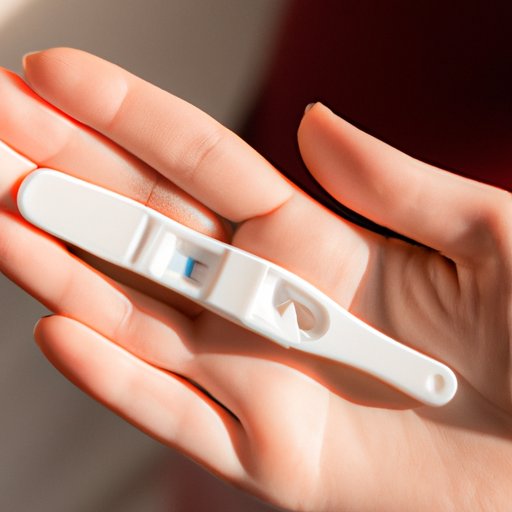
Introduction
Finding out if you are pregnant can be an exciting, yet nerve-wracking experience. Whether you are trying to conceive or it comes as a surprise, it is important to know the early signs and symptoms of pregnancy. In this article, we will discuss how to know if you are pregnant, including common symptoms, physical changes to expect, and when to seek medical advice. This guide is intended for women of all ages who suspect they may be pregnant.
Symptoms to Look Out For
One of the first signs of pregnancy is a missed period. Other common symptoms to look out for include nausea, vomiting, fatigue, and breast tenderness. Some women may also experience cramping or spotting, which can sometimes be mistaken for an early period. If you suspect you may be pregnant, look out for these symptoms and keep track of any changes you notice in your body.
Home Pregnancy Tests
Home pregnancy tests are a convenient and affordable way to confirm if you are pregnant. These tests work by detecting the presence of the hormone human chorionic gonadotropin (hCG) in your urine. You can purchase a home pregnancy test at your local pharmacy or supermarket. To get an accurate result, make sure to follow the instructions on the packaging carefully. Most tests recommend taking the test in the morning when hCG levels are highest. However, you can take the test at any time of the day. It is important to note that home pregnancy tests are not always 100% accurate, especially if taken too early. If you receive a negative result but still suspect you may be pregnant, wait a few more days and take the test again.
Symptoms Specific to Early Pregnancy
During early pregnancy, your body goes through many changes in preparation for the growing fetus. Some common symptoms during early pregnancy include fatigue, nausea, vomiting, breast tenderness, and frequent urination. You may also experience food cravings or aversions, mood swings, and constipation. These symptoms will vary from woman to woman, and you may experience all, some, or none of them.
Physical Changes to Expect
Pregnancy can cause a variety of physical changes in your body, some of which can be uncomfortable. One of the most noticeable changes is weight gain. You can expect to gain between 25-35 pounds during pregnancy, depending on your pre-pregnancy weight and your body type. You may also experience bloating, swelling in your hands and feet, and stretch marks on your skin. It is important to maintain a healthy diet and exercise routine throughout your pregnancy to promote a healthy weight and manage these physical changes.
Talking to Your Doctor
If you suspect you may be pregnant, it is important to speak with your healthcare provider. They can confirm your pregnancy and monitor your health throughout your pregnancy journey. During your first prenatal visit, your healthcare provider will perform a physical exam, including a pelvic exam and Pap smear. They may also recommend blood work and an ultrasound to confirm your due date and check on the baby’s health.
Impact on Daily Life
Pregnancy can impact your daily life in many ways, including changes in energy levels, appetite, and sleep patterns. You may find yourself feeling more tired than usual, especially during the first trimester. Your appetite may also change, and you may crave certain foods or experience food aversions. It is important to listen to your body and eat a well-balanced diet to promote a healthy pregnancy. It is also common to experience difficulty sleeping due to discomfort or frequent trips to the bathroom. Try to create a relaxing bedtime routine and avoid caffeine and electronics before bed to promote a better sleep pattern.
Preventing Pregnancy
If you are not ready to become pregnant, there are many methods of contraception available to you. Some options include hormonal birth control pills, condoms, and IUDs. However, if you are experiencing symptoms of pregnancy, it is important to seek medical attention as soon as possible. Prevention is no longer an option, and it is important to focus on a healthy pregnancy.
Conclusion
If you suspect you may be pregnant, it is important to know the early signs and symptoms of pregnancy. Home pregnancy tests are a convenient and affordable way to confirm pregnancy, but it is important to speak with your healthcare provider for prenatal care and monitoring. As your body changes throughout pregnancy, it is important to maintain a healthy diet and exercise routine and listen to your body’s needs.




